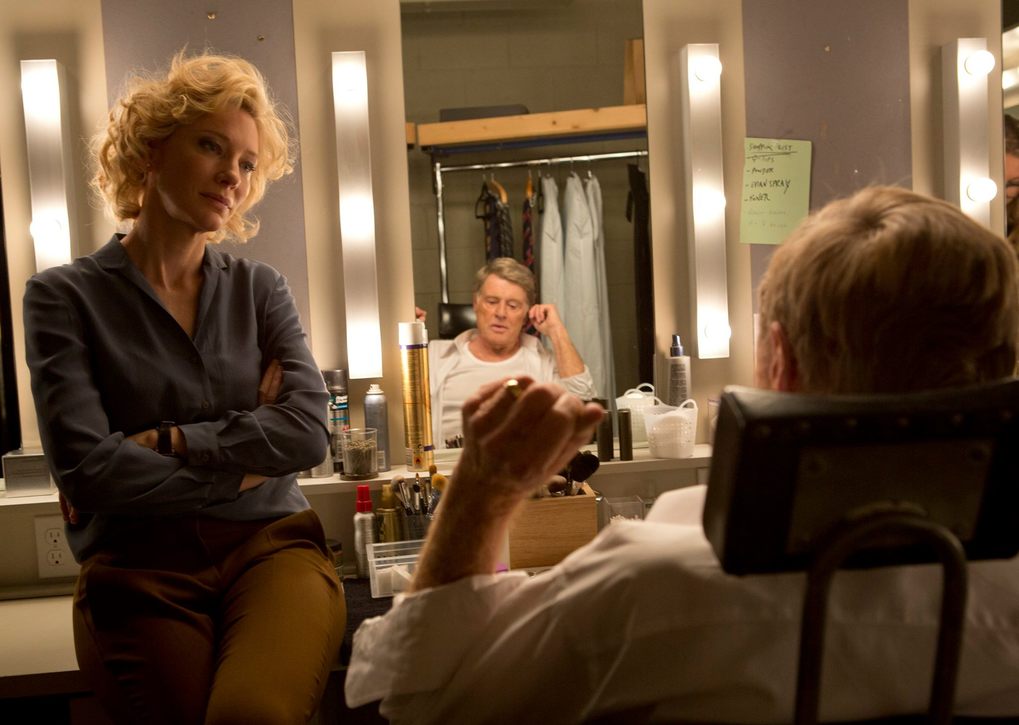NOVEMBER 6, 2015
Let’s time-travel back to 2004. On September 8 of that year, two months before the Presidential election, “60 Minutes Wednesday,” anchored by Dan Rather and produced by Mary Mapes, aired a blockbuster report alleging that President George W. Bush, who was seeking reelection at the time, had strings pulled for him to get into the Texas Air National Guard to avoid Vietnam, and that once in, he failed to reach even the most minimal performance requirements. In addition, after being transferred to the Alabama Air National Guard, he appeared to go AWOL for much of 1972. For a President whose reputation was based on his macho “shock and awe” incursion into Iraq, this report was potentially devastating.
That’s the set-up for writer/director James Vanderbilt’s “Truth,” which follows the information gathering, then the broadcast and finally the devastating aftermath, in which Mapes was fired and Rather, after a distinguished journalism career, had to resign. No news anchor as esteemed as Rather had ever left his job under such circumstances, which gives Vanderbilt a wide field with which to work. Unfortunately, he doesn’t do much with it.
The build-up to the firestorm works well, as Mapes (Cate Blanchett), who is at the top of her game as a producer, gets a tip that a colleague of Bush’s, Bill Burkett (Stacy Keach), has proof of Bush’s negligence of his military service. What he gives her are copies of documents which appear to be genuine, which Mapes sets out to investigate. Unfortunately, CBS has some scheduling issues with the show, so if the report was to be timely, it had to be ready for air in a few days, without time for full vetting. Mapes agrees, and anchor Dan Rather (Robert Redford) goes on air with the story that Mapes has provided.
After celebrating their news-making scoop, Mapes and her team come almost immediately under fire when charges are leveled that the font and the spacing in the documents were not available in 1972 and that the tiny raised “-th” in, let’s say”17th,” could not be produced on a typewriter. What was once a scoop about a U.S. President shirking his military responsibility suddenly becomes an exposé of questionable journalistic standards.
It’s in Act 3 where the film really bogs down, as Mapes and Rather are raked over the coals, initially by Bush loyalists who have circled the wagons to protect the President and finally by the suits at CBS who determine that both will have to pay a price for embarrassing the network. The forward motion of the narrative just stops as we wait and wait for the inevitable ax to fall.
Vanderbilt based his screenplay on Mapes’ memoir “Truth and Duty: The Press, The President and The Privilege of Power,” so it is told primarily from Mapes’ point-of-view and, as such, should be taken with a grain of salt. It would have made for a fuller telling of the story if we had been more of the panic and decision-making on the executive side of the table, or even some real reporting (documents are simply handed to the “60 Minutes” team), but “Truth” sets out to tell Mapes’ story only.
Vanderbilt fortunately has assembled a top-notch cast to flesh out his narrative. As members of Mapes’ team, the wonderful Elizabeth Moss is wasted in a throw-away role, but Topher Grace and Dennis Quaid, who have always had terrific chemistry (as they did in 2004’s “In Good Company”), revive that relationship to great effect here.
I am a huge fan of Robert Redford, but being blessed with such an iconic face, it’s difficult for him to portray real people, especially public figures like Dan Rather whose facial features are just as iconic. Yes, he gets Rather’s Texas drawl down pat, but you look at him and he’s Robert Redford. That’s tough to put aside.
Besides, “Truth” is basically Blanchett’s show from start to finish, and she’s wonderful in the role. She develops a fully-dimensional Mary Mapes, from her juggling her family responsibilities with the demands of being a hard-charging television producer. If there’s a reason to see “Truth,” it’s to catch Blanchett in full force.
If only “Truth” was as good as its star.
GRADE: C












